After the tensions of the weekend, General Synod had a more typical day on Monday. Sighs of relief all round. And, as it happened, the subjects for debate were things we tended to agree about. So things ended better than they began, with a top comedy slot at the end. Now read on…
Welcoming the stranger?
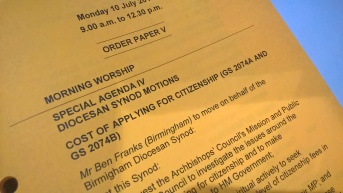
The Birmingham motion
Proceedings opened with a motion from Birmingham diocese about the cost of applying for citizenship. Synod tends to be heavily loaded with people who were born and bred in the UK, so this was a subject about which many of us know little. But – as we saw in the way local churches responded to Grenfell Tower – parish churches deal directly and at some cost with asylum seekers, immigrants and their families. Ben Franks, introducing the debate, noted how clergy are often asked to provide references for people undertaking the expensive and difficult process.
- it is bureaucratic (the application form has 80 pages) it is costly (£1,282 for an adult, £972 for a child) process
- the fees are disproportionate, especially for those in low-paid jobs.
It’s hard not to agree that the whole business is designed to make it as difficult as possible.
The supporting papers for this debate (Birmingham one here and Secretary-General’s Note here) reveal how unfair and unwelcoming the whole thing is. It’s a little-known scandal, and the motion urged us to raise the matter with our MP.
- A lawyer specialising in child welfare told us that the Home Office is basically making a profit out of every application, and for children, lives have to go ‘on hold’ while they grind through the system’s maze of requirements.
- A youth worker spoke of the trauma of his son’s application being refused, and the help he got from his diocese and Bishop in re-applying (for another £1,000…).
- A long-stay American citizen reminded us that citizenship is about participation – voting, for example.
There was a double significance in Synod picking up this subject:
- The church as a voice for the voiceless: personal stories of people who have had to go through this process, or churches who have helped them
- Speaking the truth to power: there was united criticism of the disproportionate cost and Kafka-esque process required of people, and a commitment to take this to Parliamentarians. The Home Office (where Theresa May used to be in charge…) came in for particular criticism.
From a Synod-watchers perspective, this was the best debate of the weekend: full of Christian passion and speeches from people who knew what they were talking about. And, very unusually, there were 376 in favour, no votes against and no abstentions.
Sadly, it got minimal media coverage compared to the more pressing issues of clergy vesture (see below) and the potential for transgender liturgy (see yesterday).
Sock it to me

bathwellschap exclusive: the synod sock drawer (image credit: makitorfixit.com)
After that we went into Synodical navel-gazing: what Sue Booys called ‘the sock-drawer of General Synod.’ She meant the Elections Review Group: asking what can be learned from the 2015 elections to Synod, and what changes are required before the 2020 elections?
They have been looking at online voting in 2020, replacing the cumbersome postal votes in the dioceses, which are expensive to run, and probably ensure a low turnout among electors (members of Deanery Synods and licensed clergy).
- There was some technical stuff about whether the Province of York is over-represented compared to Canterbury.
- Some concerns were raised that older people are less likely to be comfortable with internet use.
To my mind, if we are talking about 2020, the digital revolution will have gone even further. There were howls of criticism after the women bishops legislation train crash four years ago. The criticism was that Synod is unrepresentative (because voter turnout at the 2010 elections (and again in 2015) was low). So if we can increase the turnout, we’ll get a better Synod. And the ease of button-pressing, as opposed to the hassle of writing, finding a stamp and posting a form will achieve that.
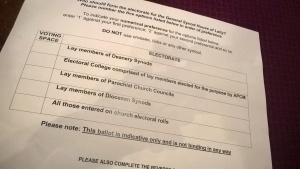
Who gets to choose: a straw poll
We then spent some time looking at the ‘electoral college’ for the House of Laity. Currently, they are elected by members of your local Deanery Synod. But there is widespread dissatisfaction with this, so we had a series of presentations about different ways of doing it. And then a straw poll! Non-binding, just to take the temperature, and so on.
If you wish to dig into this particular sock drawer, the papers are here.
The vesture venture
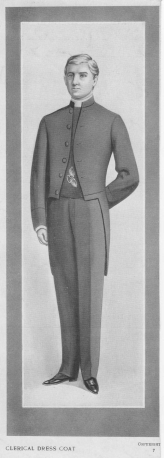
Outfit: clerical clobber is not what it used to be
To my delight, we finally got Amending Canons Nos 36 and 37 through and off for Royal Assent. No. 37 is purely pastoral, and uncontroversial: it overturns the centuries-old prohibition on giving Christian burial to someone who has taken their own life. It is universally ignored by clergy, so this simply makes the law reflect the real world.
No. 36 has been more controversial. After a false start 20 years ago, the current process got started in 2014. It’s about whether clergy must always wear robes (we’ve been describing this as ‘vesture’) when conducting services. Many, many churches do dispense with robes for informal (or all) services; others would think it unthinkable (if you see what I mean). So the revised Canon B.8 gives permission for what is already happening in many places.
(If you really really want to get the back-story here, see my post Putting on the Style from 2014.) Bath & Wells’ own James Dudley-Smith set up a positive discussion by reminding us that the decision should not be made for the clergy’s benefit or comfort: it should be for those who are attending the service, be they ‘regulars’ or people attending a funeral.
Immediately afterwards, we passed No. 37, after hearing some moving stories from people with personal experience of being involved in the funeral of someone who had taken their own life.
Money, money, money (and vision!)
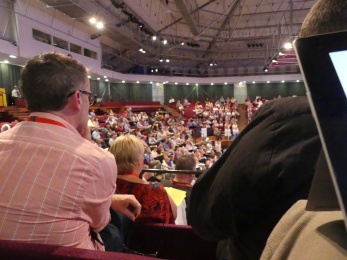
Concentration: an attentive Synod chamber
The Archbishops Council is the body that holds together pretty well all the national activities and specialisms of the Church of England (other than those handled by the Church Commissioners). So even though their Annual Report and next year’s budget was the last thing on the formal agenda plenty of people stayed to discuss them.
- Next years’ budget? 41 million pounds
- Increasing budgets for next year are evangelism, discipleship, safeguarding and Renewal and Reform.
- To achieve that, freezes are being applied to some other areas.
- The troubled business of providing support for housing for clergy going into retirement is getting some increases, but the whole system is being reformed – some near-retirees are not happy.
- Increasing ordinand numbers by 10% is great! But paying for their training and their ministry and housing is going to frighten diocesan finance people.
Some of the financing, it is hoped, will come from a what was described as a ‘cunning plan’ –a special deal with the Church Commissioners.
- But we were reminded of over-extending in the past (Ashford, anyone?). These risks must be carefully examined, said Keith Cawdron, a long-serving DBF finance expert.
- Training institutes are not financially stable at the moment, said Charles Read from Norwich: what will happen in the future with the changes in view? How can we stabilise them?
- Thanks to the finance Chair Canon John Spence’s winning ways, the budget voting went through without the picky debating points that we sometimes get.
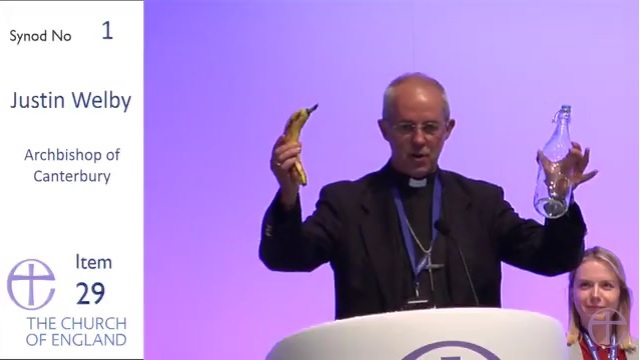
Why is he holding a bottle and a banana? (To get the answer, follow YouTube link below)
And after all that we had hysterically funny farewells in which Justin Welby told stories about Bishops Mike Hill (Bristol) and Nigel Stock (Bishop at Lambeth). (And they are both retiring into the diocese of Bath & Wells…) It’s worth going to the YouTube to watch these – spin through to about 1hr 30 mins.
And finally…
Trying to sum up a Synod is hard. This one started very badly, You’ll recall I wrote about the tetchy atmosphere on Friday evening. There was nervousness, anticipation, and fear about the potential for the sexuality-related debates to explode. That was compounded by the very poor topical post-election Still small voice debate that the Archbishops inserted into the agenda.
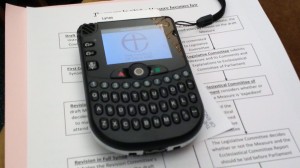
Yes/No: not everything can be sorted out by voting
However, the increased social time defused some concerns, and in the end, the Ozanne PMM went off better than many (whatever their views) feared. At a group meeting later in the weekend, I suggested that part of the problem with that – and the gender dysphoria debate on Sunday – was that these are not topics suited to ‘win/lose’ debates. They require conversation and listening as people share their experiences, and try to work out what to do with what they have learned. Some ‘Shared Conversation’ time might have helped to get the story-telling and reaction done in a calmer atmosphere.
That said, it’s apparent to everyone that the Church of England has now made an explicit public policy shift.
- It is now formal policy that we both accept and welcome LGBT people into our churches. Effectively, the Church accepts that gay people were made by God that way. This will be news to some people, and a considerable minority remain opposed to formal liturgical recognition of same-sex relationships, let alone licensed ministers being in same-sex relationships.
- How this policy works out is another question: we heard of many churches where couples are very welcome, the parish is involved in Pride marches, etc etc. We were told of others where gay people felt afraid to reveal themselves as such. And there will be others where the new outlook will not be put into practice: sometimes through ignorance, sometimes through prejudice.
- The acceptance of the Blackburn gender dysphoria motion, unamended, surprised me. But again, it indicates a sea-change.
- The 26-year reign of Issues in Human Sexuality as the touchstone for policy in these matters is coming to an end. The promised ‘teaching document’ must replace it, and will presumably contain material that offers a policy that can be applied to ordinands, licensed clergy and others in a way that Issues was never designed to. But 2020 is a long way away and some people are impatient.
Two other thoughts on this
- Where were the Bishops? There are more than 50 of them on Synod, but we heard very little from them on either of these motions. Some will still be nursing bruises from February, but the suspicion is that they are keeping their heads down. Apart from Archbishop Sentamu and the Bishop of Liverpool, they largely remained quiet.
- Where was the theology? A number of discussions I’ve been in (in the bar and in committees) bewailed the fact that much of the debate (on both motions) was personalised and story-driven. There was little theological reflection (apart from a few nods to Scripture, Tradition and Reason). While we were intensely pastoral, then, we were not as analytical as befits a major Synod with carefully-designed processes of scrutiny and decision-making.
And finally

Coffee, tablet, banana – Bathwellschap’s blogging kit.
Once again, I am amazed at the readership of this blog, and the worldwide reach. One or two people have been kind enough to nobble me and express thanks for the jokes and for the even-handedness. (And for the factual content, of course.)
I’m not sure I realised this when I started, but I suspect the bathwellschap blog philosophy was instilled in me by my time working in the BBC – to inform, educate and entertain, as Lord Reith put it.
Stats-watchers may like to know that these July posts have reached 830 people (not counting this page, obv).
- Most just read the latest post, one in three goes on to look at another one.
- Nearly all are in the UK, which seems reasonable.
- Astonishingly, there are single readers in Israel, Bermuda, Uganda, Argentina and Belarus. The Swiss contingent has gone up this time – that’s either my sister on holiday there, or one of our Bath & Wells clergy who has taken up a post there and yearns to catch up with the old country.
Synod meets again in February, with a further revolution – we’ll end with a Saturday sitting! The idea is to help members who work in the week: we’ll start later in the week (which day is not yet known) and keep going till Saturday afternoon. Clergy with sermons to write might not be too happy…
The blog will be back then and I’ll faithfully report how it works out.
+++++++++++++++++++++++++++++++++++++++++++++++++++++++++++
* Good times, better times, A rather naff 1968 Cliff Richard song that just came into my head while trying to make sense of the Synod weekend overall, maybe because the end was better than the beginning. Written by master-popsters Jerry Lordan, Roger Cook and Roger Greenway. May not be their best work.

Thank you for your posts. They help those of us not there but vaguely interested up to speed with the goings on of Synod!
Thank you! ‘We aim to please’ (and to be accurate-ish as well.)
Sorry to disappoint. Your Uganda reader is a former Lambeth Palace staff member!I spend a few ,onthe here each year standing alongside a south Sudanese community. Too expensive to watch live stream so great to have a commentary
Thanks for being in touch. I have good memories of a fleeting visit to Uganda in the 80s, just after the current President came to power.
One of many who are very grateful indeed for your daily updates, written with such care, detail, and humour ! Tell me, what was Justin doing taking his trainers off mid-speech ? Clearly reference back to something earlier Hope you now get some Andrew
Sent from Samsung tablet.
The trainers thing was a reference back to the debate on clergy vesture: someone making a speech pointed out that in the olden days Archbishops wore black shoes, but he had seen Justin wearing… blue trainers that very day. Justin pointed out that they were walking shoes, not trainers. Should have put that in the blog!
Taking some time off round next weekend as it is that significant anniversary…
An account of GS that is salient, comprehensive, comprehendible and entertaining in the truest sense. Thank you! How come I only just found this?!
Well, you can’t keep in touch with all your old friends – you have too many!
But I’m delighted
a) you found it and
b) you approve!
And thanks for the huge compliment.
Pingback: Anglican Mainstream South Africa » Blog Archive » Is general Synod competent?